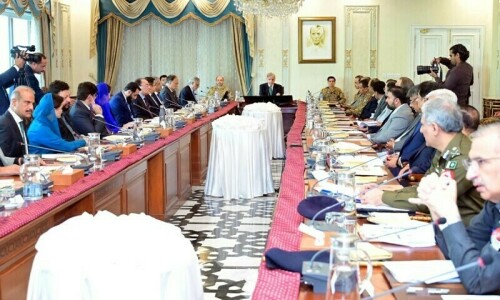ISLAMABAD, May 24: The Speaker of the National Assembly, Dr Fehmida Mirza, saved Prime Minister Yousuf Raza Gilani from being disqualified on Thursday, only to unleash a heated debate among the legal fraternity on her role and the legality of her decision, and threats from political opponents to challenge her decision in a court of law.
Her move came as the prime minister decided to file an appeal against his April 26 Supreme Court contempt conviction. The prime minister was convicted for contempt after refusing to send a letter to Swiss authorities, requesting the latter to reopen money laundering cases against President Asif Ali Zardari.
Mr Gilani is of the view that the president enjoys immunity under the constitution, and that no case can be tried against the president in any court.
The court decision in the prime minister’s case caused frenzy among the legal community, as has Dr Mirza’s judgment.
Dr Mirza’s legal position
“I am of the view that the charges against Syed Yousaf Raza Gilani do not give grounds for a disqualification under paragraph (g) or (h) of the Constitution’s Article 63. And the Supreme Court has not framed any charge claiming the propagation of any opinion, acting in any manner against the independence of the judiciary or ridiculing the judiciary as stipulated under Article 63 (1) (g),” the speaker said.
The speaker was ”seriously” concerned over letters sent by the Supreme Court’s Assistant Registrar, detailing the short order and the judgment.
She rejected the March 30, 2012 reference sent to her office by Moulvi Iqbal Haider under clause (2) of Article 63. In it, Mr Haider prayed that the question regarding the prime minister’s disqualification was referred to the ECP, since Mr Gilani had already become disqualified from membership in the National Assembly as a result of the Supreme Court conviction.
“The petition of Moulvi Iqbal Haider is without any merit,” said Dr Mirza.
Dr Mirza also quoted several cases to argue that the speaker is more than just a post office, including Kanwar Intizar Muhammad Khan vs the Federation of Pakistan.
“If a reference is submitted to [the speaker], he is not bound to forward [or] transmit [it] to the Chief Election Commissioner [...] The speaker has to apply his own mind judiciously after fully taking into consideration the relevant provisions on the subject and then decide [...] whether ‘any question’ [regarding] disqualification has ‘arisen’, which may justify [a] reference to the Chief Election Commissioner.”
She also referred to a 2004 case against MNA Makhdoom Javed Hashmi, arguing that the “government […] raised [objection] but the then Speaker of the National Assembly overruled the objection and accepted [Mr Hashmi’s] nomination papers[…].”
Political and legal reactions
“The decision of the speaker is a victory of democracy,” said Prime Minister Gilani.
The leader of the opposition in the National Assembly, Chaudhry Nisar Ali Khan of the Pakistan Muslim League-Nawaz (PML-N) could not disagree more.
Mr Nisar “condemned” the speaker’s ruling, saying that it was the decision of a Pakistan People’s Party (PPP) activist as opposed to that of a speaker fulfilling her duties. According to Mr Nisar, the PPP had always used political offices to promote their personal and political objectives.
“Our legal experts will review [Dr Mirza’s ruling]. Any decisions [on whether the case would be challenged in a court of law can...] only be made in the party meeting.”
He said the speaker had failed to provide solid examples from Pakistan or any other country to support her decision.
“Javed Hashmi was convicted by a lower court, whereas the prime minister has been convicted by the highest court,” he said.
While Jamiat Ulema-i-Islam Fazlur Rehman’s (JUI-F’s) leader, Abdul Ghafoor, called the Supreme Court verdict vague, Pakistan Tehrik-i-Insaaf (PTI) spokesman Shafqat Mehmood said that the speaker has no power to withhold the reference from the ECP.
Justice (retd) Tariq Mehmood and a senior, serving high court judge said that the speaker had to give her decision within 30 days of the Supreme Court ruling -- otherwise the case would have been transferred to the Election Commission of Pakistan (ECP). But Justice Mehmood said that Dr Mirza should have waited until the prime minister filed an appeal in the Supreme Court.
According to a source in the National Assembly, the speaker gave her verdict because it will strengthen the prime minister’s appeal. He will be able to argue that the parliament has ruled in his favour.
The prime minister’s lawyer, Aitzaz Ahsan, told Dawn that the prime minister has a right to file an appeal even after the speaker’s ruling.
And Law Minister Farooq Naek said the speaker’s judgement could be challenged in the high court – though the court would have to prove the sustainability of the petition.
Kanwar Dilshad, the former secretary of the ECP, however, disagreed.














































Dear visitor, the comments section is undergoing an overhaul and will return soon.